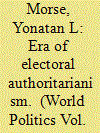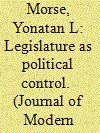| Srl | Item |
| 1 |
ID:
112513


|
|
|
|
|
| Publication |
2012.
|
| Summary/Abstract |
In recent years scholarly attention has shifted from the study of democratization to the phenomenon of electoral authoritarianism. In these regimes, regular elections are held for national legislatures and chief executives, yet they fail to live up to democratic standards of freedom and fairness. A range of new research has investigated these regimes and especially the capacity of elections to either dislodge or reinvigorate authoritarian incumbents. This article reviews some of the current work on electoral authoritarianism and attempts to find ways to achieve synthesis and better theoretical development. It notes the need for greater conceptual consensus, attention to context, and better evaluation of what electoral competiveness means under authoritarian conditions. It argues that the next stage for research should be smaller and contextual comparison that can allow for greater attention to concepts, while allowing for strong midrange theory.
|
|
|
|
|
|
|
|
|
|
|
|
|
|
|
|
| 2 |
ID:
181834


|
|
|
|
|
| Summary/Abstract |
A growing literature has begun to more closely examine African legislatures. However, most of this research has been attentive to emerging democratic settings, and particularly the experiences of a select number of English-speaking countries. By contrast, Cameroon is a Francophone majority country that reintroduced multiparty politics in the early 1990s but continues to exhibit significant authoritarian tendencies. This article provides a longitudinal analysis of Cameroon's National Assembly and builds on a unique biographical dataset of over 900 members of parliament between 1973 and 2019. The article describes changes in the structure and orientation of the legislature as well as the social profile of its members, in particular following the transition to multipartyism. While the legislature in Cameroon remains primarily a tool of political control, it is more dynamic, and the mechanisms used to manage elites within the context of complex multiethnic politics have evolved.
|
|
|
|
|
|
|
|
|
|
|
|
|
|
|
|